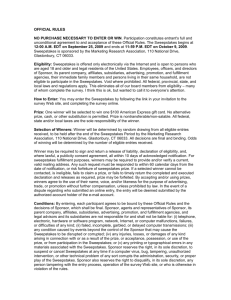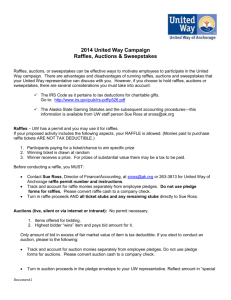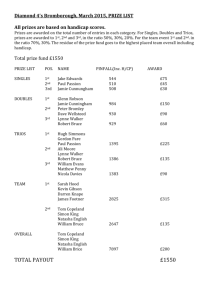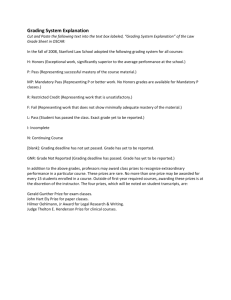Federal and State Laws on Sweepstakes and Contests
advertisement
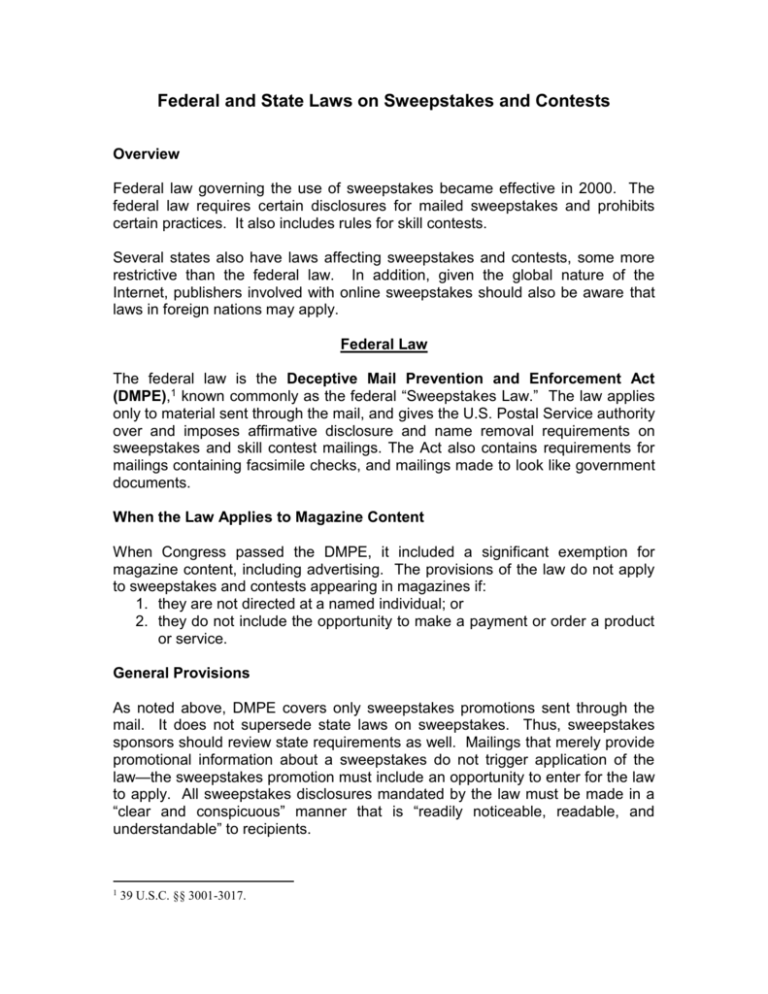
Federal and State Laws on Sweepstakes and Contests Overview Federal law governing the use of sweepstakes became effective in 2000. The federal law requires certain disclosures for mailed sweepstakes and prohibits certain practices. It also includes rules for skill contests. Several states also have laws affecting sweepstakes and contests, some more restrictive than the federal law. In addition, given the global nature of the Internet, publishers involved with online sweepstakes should also be aware that laws in foreign nations may apply. Federal Law The federal law is the Deceptive Mail Prevention and Enforcement Act (DMPE),1 known commonly as the federal “Sweepstakes Law.” The law applies only to material sent through the mail, and gives the U.S. Postal Service authority over and imposes affirmative disclosure and name removal requirements on sweepstakes and skill contest mailings. The Act also contains requirements for mailings containing facsimile checks, and mailings made to look like government documents. When the Law Applies to Magazine Content When Congress passed the DMPE, it included a significant exemption for magazine content, including advertising. The provisions of the law do not apply to sweepstakes and contests appearing in magazines if: 1. they are not directed at a named individual; or 2. they do not include the opportunity to make a payment or order a product or service. General Provisions As noted above, DMPE covers only sweepstakes promotions sent through the mail. It does not supersede state laws on sweepstakes. Thus, sweepstakes sponsors should review state requirements as well. Mailings that merely provide promotional information about a sweepstakes do not trigger application of the law—the sweepstakes promotion must include an opportunity to enter for the law to apply. All sweepstakes disclosures mandated by the law must be made in a “clear and conspicuous” manner that is “readily noticeable, readable, and understandable” to recipients. 1 39 U.S.C. §§ 3001-3017. Required Disclosures Any solicitation to enter a sweepstakes or contest must contain the following information: 1. the official rules; 2. all terms and conditions for participating in the sweepstakes or contest; 3. the entry process; 4. the name of the sponsor or mailer of the sweepstakes; 5. the contact information for the sponsor or mailer of the sweepstakes The official rules must include: 1. the estimated numerical odds of winning; 2. the number of prizes to be awarded; 3. the estimated retail value of the prizes to be awarded; 4. the nature of the prizes to be awarded; and 5. the schedule of payments if the prize is paid over time. Sweepstakes solicitation mailings must include statements that no purchase is necessary to win and statements that purchasing the sponsors’ products will not increase one’s chances of winning. These statements must meet the following requirements: 1. they must be more conspicuous than the other required disclosures; and 2. they must appear in the following three places in a mailing: a. in the solicitation letter; b. in the order or entry form; and c. in the official rules Required Disclosures for Skill Contests Skill contests are defined by the Federal Trade Commission (FTC) as, “Puzzles, games or other contests in which prizes are awarded based on skill, knowledge or talent – not on chance.”2 In these skill contests, sponsors must disclose: 1. the estimated number or percentage of participants who will win the skill contest; 2. the approximate number or percentage of participants who have won the sponsor’s past three skill contests; 3. the judging methods; 4. the identity or a description of the qualifications of the judges; 5. the date on which winners will be selected; 6. the date or process by which prizes will be awarded; 7. the number of rounds of competition; Federal Trade Commission, You Don’t Have to Pay to Play!, FTC FACTS FOR CONSUMERS, July 2000, at 2. 2 8. whether subsequent rounds of competition will be more difficult than early rounds; and 9. the maximum cost to enter the entire competition. Prohibited Practices 1. Mailings must not indicate that those who do not purchase sponsors’ products or services will not receive future sweepstakes mailings; 2. Mailings must not indicate that an individual is a winner unless that person has actually won; 3. Mailings cannot require that sweepstakes entries be accompanied by orders or payments for previously ordered products or services; 4. Mailings cannot contain inconsistencies within the official rules or disclosures. Facsimile Checks Facsimile checks must contain a disclosure on the face of the document indicating that the check is non-negotiable and that it has no cash value. Opt-Out Requirement Mailings for sweepstakes and contests must display clearly and conspicuously a toll-free telephone number or address by which recipients can contact the sponsor to be removed from any future mailings. Upon receipt of a removal request, the sponsor must remove the requester’s name and address from mailing lists within 60 days. Penalties for Non-Compliance The Postal Service can assess penalties for violations of up to $1 million. The fines are $25,000 for mailings of less than 50,000 pieces, $50,000 for mailings of between 50,000 to 100,000 pieces, and an additional $5,000 for each 10,000 pieces above 100,000 up to a maximum fine of $1 million. For violations of the opt-out provisions, recipients may sue for injunctive relief and damages up to $500 per violation, which can be trebled for willful violations. In addition, mailers who mail solicitations “recklessly” to those requesting removal can face statutory penalties to the federal government of $10,000 per mailing, and penalties of up to $2 million for selling the names and addresses of individuals requesting removal from mailing lists. State Laws State prize and gift notification laws also regulate the offering of sweepstakes, gifts, prizes, and premiums. Such regulation may include specific disclosure requirements for sweepstakes and contests, prohibitions on conditioning the receipt of prizes or gifts on the purchase of a product, prohibitions on “everybody wins” sweepstakes and restrictions on the use of simulated checks. Many of these state laws also impose various disclosure requirements on the offering of gifts or premiums. Alabama: Sweepstakes Solicitations – Ala. Code §§ 8-19D-1 to 8-19D-1 (2006). Arkansas: Prize Promotion Act – Ark. Code. Ann. §4-102-101 to 4-102-109 (2006). California: Prize Notification – Cal. Bus. & Prof. Code § 17537 (2006); Solicitation materials containing sweepstakes entries - Cal. Bus. & Prof. Code § 17539.15 (2006); Unlawful advertising; conditional offer of prizes or gifts – Cal. Bus. & Prof. Code §§ 17537 – 17537.1 (2006). Colorado: Sweepstakes and Contests – Colo. Rev. Stat. §§ 6-1-802 to 6-1-804 (2006). Connecticut: Sweepstakes – Conn. Gen. Stat. §§ 42-295 to 42-300 (2006). Florida: Game Promotion Registration Law – Fla. Stat. Ann. § 849.094 (2006). Georgia: Fair Business Practices Act – Ga. Code Ann. §§ 10-1-392 to 10-1-393 (2006). Hawaii: Offers of gifts or prizes; unlawful – Haw. Rev. Stat. § 481B-1.6 (2006). Illinois: Prizes and Gifts Act – Ill. Comp. Stat. Ch. 815 §§ 525/1 – 525/35 (2006); Offers of free prizes, gifts or gratuities; disclosure of conditions – Ill. Comp. Stat. Ch. 815 § 505/2P (2006). Indiana: Promotional Gifts and Contests – Ind. Code Ann. §§ 24-8-1-1 to 24-86-3 (2006). Iowa: Prize Promotions – Iowa Code §§ 714B.1 – 714B.10 (2006). Kansas: Prize Notification – Kan. Stat. Ann. § 50-692 (2006). Kentucky: Use of mailed document purporting to inform of winning a prize – Ky. Rev. Stat. Ann. § 365.055 (2006). Louisiana: Promotional Contests – La. Rev. Stat. Ann. §§ 51:1721 – 51:1725 (2006). Maryland: Offers of conditional prizes; exceptions – Md. Code Ann. Com. Law I § 13-305 (2006). Michigan: Lotteries – Mich. Comp. Laws § 750.372a (2006). Minnesota: Prize notices and solicitations – Minn. Stat. § 325F.755 (2006). Nevada: Sales Promotions – Nev. Rev. Stat. §§ 598.131 – 598.139 (2006). New Hampshire: Prizes and Gift Act – N.H. Rev. Stat. Ann. §§ 358-O:1 to 358O:10 (2006). New Jersey: Notification to person that he has won prize and requiring him to perform act – N.J. Stat. Ann. § 56:8-2.3 (2006). New Mexico: Game Promotion Regulations – N.M. Admin. Code tit. 1 §§ 2.2.7 – 2.2.13 (2006). New York: Game Registration Law – N.Y. Gen. Bus. Law § 369-e (2006); Prize Award Schemes – N.Y. Gen. Bus. Law § 369-ee (2006). North Carolina: Prize Presentation Law – N.C. Gen. Stat. §§ 75-32 to 75-34 (2006). North Dakota: Contest Prize Notices – N.D. Cent. Code §§ 53-11-01 to 53-1105 (2006). Ohio: Prizes – Ohio Admin Code § 109:4-3-06 (2006). Oklahoma: Consumers Disclosure of Prizes and Gifts Act – Okla. Stat. tit 21 §§ 996.1 – 996.3 (2006). Oregon: Contest, Sweepstakes and Prize Notification Rules – Or. Admin. R. §§ 137-020-0410 to 137-020-0460 (2006). Rhode Island: Prizes and Gifts Act – R.I. Gen. Laws §§ 42-61.1-1 to 42-61.1-9 (2006); Games of Chance Registration Act – R.I. Gen. Laws §§ 11-50-1 to 11-508 (2006). South Carolina: Prize and Gift – S.C. Code Ann. §§ 37-15-20 to 37-15-100 (2006). South Dakota: Sweepstakes Prizes – S.D. Codified Laws §§ 37-32-1 to 37-3218 (2006). Tennessee: Promotions or inducements to sell goods, services or other products – Tenn. Code Ann. § 47-18-120 (2006); Prizes – Tenn. Code Ann. § 4718-124 (2006). Texas: Contests and Gift Giveaways – Tex. Bus. & Com. Code Ann. §§ 40.001 – 40.005 (2006). Utah: Prize Notices Regulation Act – Utah Code Ann. §§ 13-28-1 to 13-28-9 (2006). Vermont: Contests and Sweepstakes – Vt. Stat. Ann. tit. 13 § 2143b (2006). Virginia: Prizes and Gifts Act – Va. Code Ann. §§ 59.1-415 to 59.1-423 (2006). Washington: Promotional Advertising of Prizes – Wash. Rev. Code §§ 19.170.010 to 19.170.900 (2006). West Virginia: Prizes and Gifts Act – W. Va. Code §§ 46A-6D-1 to 46A-6D-10 (2006). Wisconsin: Prize Notices – Wis. Stat. § 100.171 (2006). Wyoming: Promotional Advertising of Prizes – Wyo. Stat. Ann. §§ 40-12-201 to 40-12-209 (2006).

